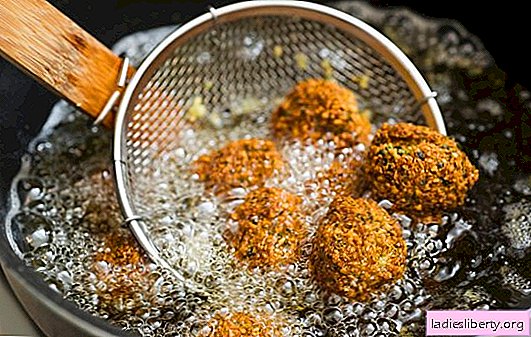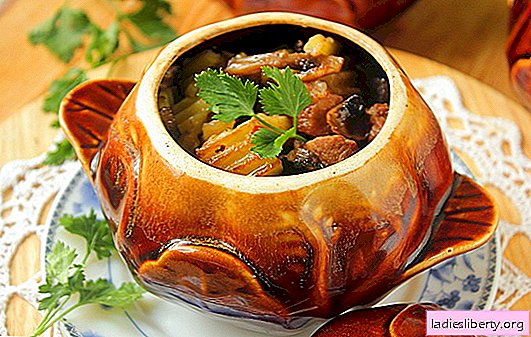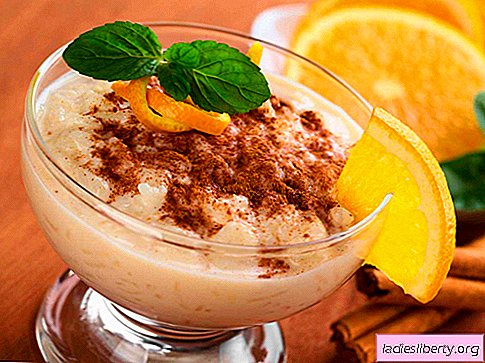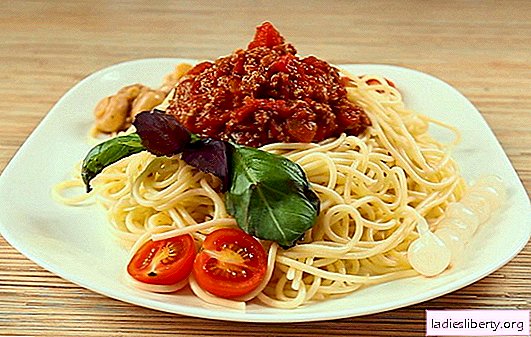
If you fry a cutlet or pancake, and even the potatoes or cheesecake are not in that oil, then the kitchen will be full of smoke. But this is the most harmless thing that can happen. Some types of oil form carcinogens, they can easily be poisoned or earn serious diseases. Which oil is better not to fry?
Oh, that point! Smoke point
There is a temperature at which even the most healthy oil becomes harmful. Therefore, in no case can it be heated to such parameters. This maximum is called the smoke point. Each oil has its own. In unrefined oils, the smoke point is much lower, so they begin to burn faster, emit unpleasant odors, and then form carcinogenic compounds.
Types of oil | Smoke point of unrefined oil | Refined smoke point |
| Sunflower | 107 | 227 |
| Creamy | 150 | - |
| Melted butter | 250 | - |
| Olive oil | 160 | 200-240 |
| Flaxseed | 107 | - |
| Mustard oil | 254 | |
| Corn | 160 | 230 |
| Palm | - | 230 |
| Coconut | 130 | 230 |
| Peanut | 160 | 230 |
Let's talk about temperatures right away
One oil is even suitable for deep-frying, while the other kind can only be used gently in a pan, trying not to overheat. What does it depend on? It is from the heating temperature.
What parameters does the oil heat up to:
- in a pan with a thin layer from 110 to 170 degrees;
- deep-frying oil is heated to 190-200 degrees;
- on an open fire, charcoal, grill, the oil is heated to 200 degrees;
- the oil in the oven is heated to 220-250 degrees;
- the temperature of stewing and quenching of products with oil does not exceed 100 degrees.
Therefore, some kind can be used for frying in a pan, for example, butter. Of course, one must try not to overheat it. But with the same butter, do not rub the meat for grilling or add to deep fat with other fats. But on the melted butter you can cook almost everything and everywhere, its smoke point is 250 degrees.
Omega: what you need to know
The possibility of using cooking oil is influenced not only by the cooking method and the smoke point. It is very important to observe the norm of omega-6 fats, which are too much in sunflower and corn oil. Ideally, they should be present in approximately equal proportions with omega-3 fats in the human diet. But, since a person most often fries food in affordable sunflower oil, Omega-6 enters the body 15-20 times more.
What threatens such an imbalance? Over time, cell regeneration is disrupted, microscopic inflammation appears, the body wears out quickly, and skin and hair problems occur. Even worse is the situation if omega-3 fatty acids do not arrive at all. It is for their high content that some unrefined oils are valued. They help out when it is not possible to use a direct source - salmon.
What kind of oil can I fry
One of the most popular and often used for frying products is refined sunflower oil. But this popularity is explained only at an affordable price. Nutritionists and nutritionists are against this species. Almost 70% of it consists of Omega-6, unlike the valuable fatty acids Omega-3 and Omega-9, the body does not need such an amount. In general, it is possible to use for frying, but it is impossible to abuse this oil, it is more reasonable to sometimes use an alternative.
What other oils to use for frying:
- Refined olive oil. Suitable for frying foods, mainly consists of omega-6, but it is important not to overheat it.
- Corn oil. Sunflower colleague, as this species is actively used in public catering because of its cheapness, is often found in fast food. It is possible to fry on it, but often it is not necessary to use.
- Coconut oil. It is ideal for frying food in a pan, beloved by adherents of a healthy diet, combined with various products, does not emit harmful substances. Coconut oil is often called the plant-based version of saturated fats, only it does not provoke an increase in cholesterol.
- Ghee, ghee or just ghee. It is actively used in Asian countries, especially in India, it is great for frying food in a pan and not only, you can heat up to 250 degrees.
- Mustard oil. This product has a high smoke point, great for frying, but has a very specific taste and smell. Therefore, it is used extremely rarely for such purposes.
You can also fry food in rapeseed oil. Its second name is canola. But in the production and purification, extremely harmful technologies are used, as a result, the amount of Omega-6 acids increases significantly. It is often impossible to use such oil.
Which oils should never be fried
There are oils that it is advisable to use only fresh. Moreover, some species do not even tolerate minimal heating. But why do people still use them for food, some even now "in fashion"? It's simple - the basic value carries a useful composition. Unrefined oils are the sources of those unique fatty acids mentioned above. Therefore, they must be consumed, but not heated.
What oils are not suitable for frying:
- Flaxseed. It can be heated to 107 degrees, but nutrients begin to disappear already at 40 degrees. Therefore, it is wiser to season with linseed oil a fresh salad or warm porridge.
- Unrefined sunflower oil. It will do more harm than good, and when heated it gives an unpleasant taste and aroma.
- Lard, goose, duck fat. Animal products are often used for frying, but it is very unhealthy, increase cholesterol, negatively affect the work of the heart.
- Palm oil. It has a high smoke point, does not have a taste and smell, is perfectly stored, which is why it is so popular in food production. Everything is fine, but it is included in the category of the most harmful products.
Also, it is not necessary to heat and use for frying, the following types include: nut, sesame oil, grape seed. Hemp oil is also returning to the shelves. Once it was very popular among the Slavs. A product rich in valuable substances, it has many advantages, but it is undesirable to use it for frying.











